By: izumi hasegawa September 9, 2016
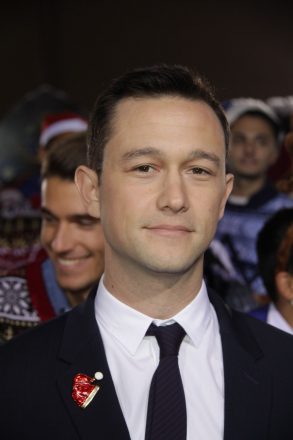
When I first heard Joseph Gordon-Levitt was cast as Edward Snowden for Oliver Stone’s new film Snowden, I was elated with the casting choice. Not just because Gordon-Levitt has the acting skills to take on a role like this, but he possesses sensitivity and strength; two of the same qualities that have been said about the real Edward Snowden.
In our interview with Joe, he shares his thoughts on patriotism, changing his vocal tone to play Snowden, and his experience of meeting Edward Snowden in person.
 Q: Your voice was noticeably different in the film, tell us about the vocal tone you used for playing Edward Snowden? Where in the process of filming did you develop that?
Q: Your voice was noticeably different in the film, tell us about the vocal tone you used for playing Edward Snowden? Where in the process of filming did you develop that?
I don’t know if I started from there, but I was certainly focusing on that, as I was also focusing on his internal life and what he was going through and what his history is and just what kind of guy he is and why he was doing what he was doing. Certainly when you’re playing a character that everyone has seen and heard, I feel like it would almost be odd if you didn’t sound at least something like him, so I wanted to try to approximate his voice.
Q: How was meeting him in person? What stood out to you the most during your meeting?
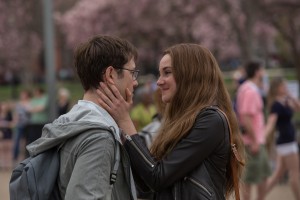 A few months before we started shooting I went to Moscow and I sat with him and Lindsay Mills, his girlfriend, who’s played in the movie by Shailene Woodley so well. We all talked for about four hours. It’s funny, because he’s always trying to take attention off himself personally and put the attention on the issues that he brings up, but I’m an actor so I’m obviously going to focus on him personally and want to get a sense of who he is just as a guy. Getting to spend that time with him was really valuable for those reasons. You can watch someone, watch how they sit, how they stand, how they shake your hand, how they eat their lunch. One of the first things I noticed was he actually has really good manners, which I found surprising, because nowadays you think of someone who’s talented on computers not necessarily as someone with social grace, but he’s from North Carolina, where I think they put more emphasis on good manners than where I’m from, in Southern California. He’s not a social butterfly. He’s not the kind of guy that’s going to go charm a whole party full of people, but he is sort of an old-fashioned gentleman, and I thought that was remarkable. I wanted to incorporate that into the performance.
A few months before we started shooting I went to Moscow and I sat with him and Lindsay Mills, his girlfriend, who’s played in the movie by Shailene Woodley so well. We all talked for about four hours. It’s funny, because he’s always trying to take attention off himself personally and put the attention on the issues that he brings up, but I’m an actor so I’m obviously going to focus on him personally and want to get a sense of who he is just as a guy. Getting to spend that time with him was really valuable for those reasons. You can watch someone, watch how they sit, how they stand, how they shake your hand, how they eat their lunch. One of the first things I noticed was he actually has really good manners, which I found surprising, because nowadays you think of someone who’s talented on computers not necessarily as someone with social grace, but he’s from North Carolina, where I think they put more emphasis on good manners than where I’m from, in Southern California. He’s not a social butterfly. He’s not the kind of guy that’s going to go charm a whole party full of people, but he is sort of an old-fashioned gentleman, and I thought that was remarkable. I wanted to incorporate that into the performance.
Q: What were you the most surprised to learn after meeting him?
He doesn’t care about himself, really. He just wants people to talk about these issues. That’s what he wants.
 Q: Was there a moment in reading the script or during filming that, irrespective of his decision to become a whistleblower, you felt best exposed his humanity or enlightened you about who he is?
Q: Was there a moment in reading the script or during filming that, irrespective of his decision to become a whistleblower, you felt best exposed his humanity or enlightened you about who he is?
This is a drama, and every drama hinges on a person changing. The real life story of Edward Snowden is an incredible drama and not just the moment of his whistle blowing. This story shows the nine years leading up to that. For example, I didn’t know before doing this project, he enlisted in the U.S. Army in 2004 and wanted to go fight in Iraq, so this is the kind of guy that feels very strongly about what he believes in and is willing to risk his life to fight for what he believes in.
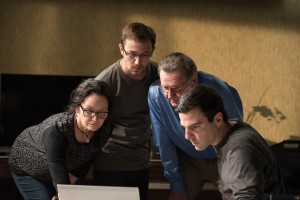 The change that happens is you see that early in the movie, I think it speaks to two different kinds of patriotism and I consider him very much a patriot. There’s one kind of patriot that just believes that everything their country does is right no matter what, without asking any questions, and there’s a different kind of patriot who believes and loves the country for what it stands for, but is also willing to hold the government accountable, and if the government deviates from those foundational principals, take it to task.
The change that happens is you see that early in the movie, I think it speaks to two different kinds of patriotism and I consider him very much a patriot. There’s one kind of patriot that just believes that everything their country does is right no matter what, without asking any questions, and there’s a different kind of patriot who believes and loves the country for what it stands for, but is also willing to hold the government accountable, and if the government deviates from those foundational principals, take it to task.
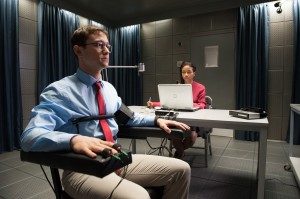 That is what’s so beautiful about the United States of America. This is why I’m so grateful to have been born and raised here is we have that privilege. Not everyone in every country in the world has that privilege, to hold the government accountable. The founders of the country wrote The Constitution and The Bill of Rights to protect our ability to do that, to hold the government accountable. To me that’s real patriotism in the United States and so watching that journey of someone who goes from that first unquestioning, blanket allegiance, I guess you could call it, patriotism, to the kind of patriotism that I think the United States of America is really built for, which is the kind of patriotism that holds the government accountable, to stick by its principals, that’s an incredible journey to see. On the one hand that sounds heady, but ultimately it’s quite an emotional thing. I think a lot of our feelings about this stuff and our opinions are mostly guided by our emotions, and then our intellects catch up to find reasons to justify how we emotionally feel. It’s much easier to change your mind intellectually than it is to change your gut feeling. It takes years. That’s what you see in this drama. You see that evolution.
That is what’s so beautiful about the United States of America. This is why I’m so grateful to have been born and raised here is we have that privilege. Not everyone in every country in the world has that privilege, to hold the government accountable. The founders of the country wrote The Constitution and The Bill of Rights to protect our ability to do that, to hold the government accountable. To me that’s real patriotism in the United States and so watching that journey of someone who goes from that first unquestioning, blanket allegiance, I guess you could call it, patriotism, to the kind of patriotism that I think the United States of America is really built for, which is the kind of patriotism that holds the government accountable, to stick by its principals, that’s an incredible journey to see. On the one hand that sounds heady, but ultimately it’s quite an emotional thing. I think a lot of our feelings about this stuff and our opinions are mostly guided by our emotions, and then our intellects catch up to find reasons to justify how we emotionally feel. It’s much easier to change your mind intellectually than it is to change your gut feeling. It takes years. That’s what you see in this drama. You see that evolution.
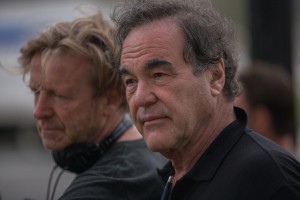 Q: How was working with Oliver Stone?
Q: How was working with Oliver Stone?
I think that Oliver is the only filmmaker who could have done this. If you think about it, he’s the only director in American cinema, and I mean big, mainstream scale, large production, Hollywood, entertaining movies, who’s willing to outright criticize the government. That’s the exact kind of patriotism I was just talking about, to say, “I love this country. I love what it stands for. The government is doing something that goes against our principals and we should all take a look at this.” There isn’t really another filmmaker who’s done that so pointedly and so courageously as Oliver Stone. If you’re going to tell the Edward Snowden story, he’s really the only guy to do it.
Snowden opens theater on September 16th.
Interview by Izumi Hasegawa (@HNW_Izumi)
Edited by Jody Taylor (@RealJodyTaylor)
Follow Whats Up Hollywood on Twitter @WhatsUpHWood
